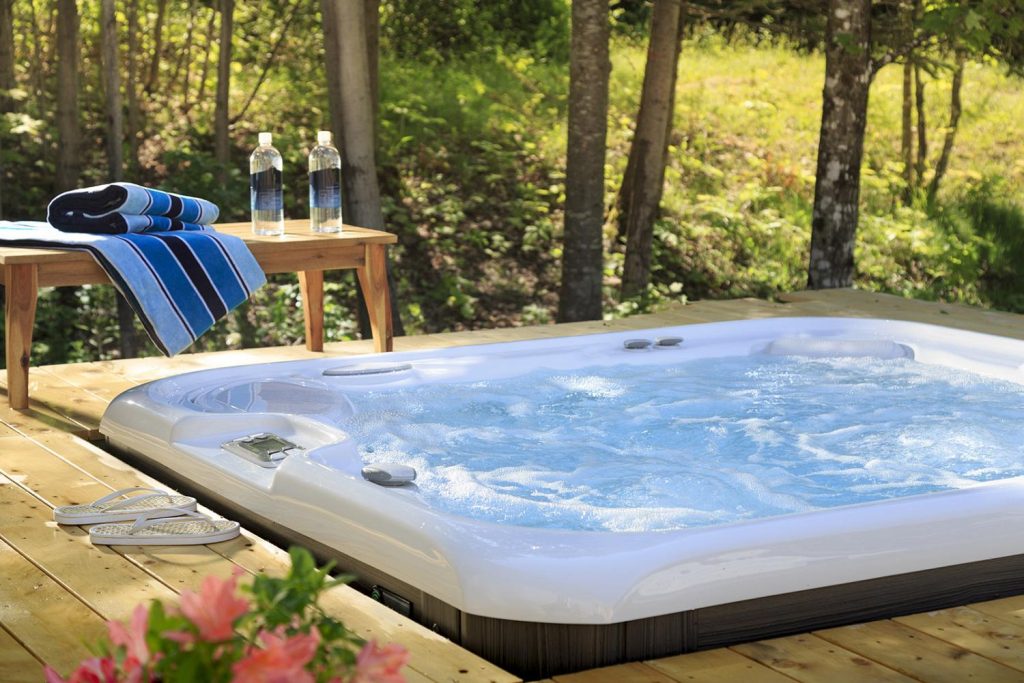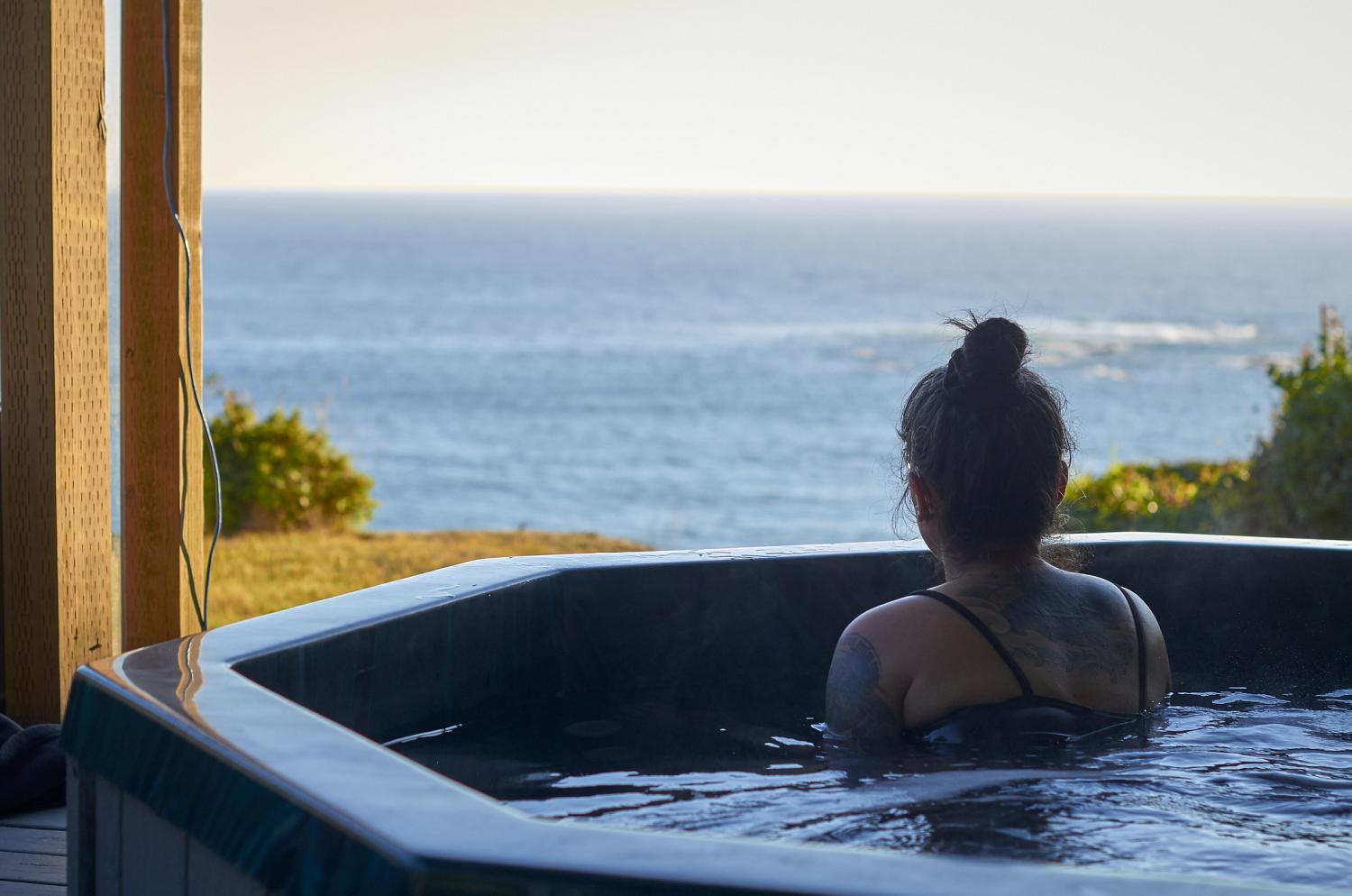If you’re looking to become a hot tub owner, you’ve probably heard the buzz about saltwater systems. Claims like “chemical-free,” “easy maintenance,” and “better for your skin” are everywhere. But do these claims hold water, or are they just marketing hype? While saltwater hot tubs have surged in popularity recently, it’s important to take a closer look at whether they’re really a better choice than traditional chlorine-based systems.
While saltwater hot tubs may seem appealing at first, there are several key factors to reconsider before making your purchase.
What Is a Saltwater Hot Tub? A Brief History
Saltwater hot tubs evolved alongside saltwater systems for swimming pools in New Zealand in the 1980s. The technology uses electrolysis to turn dissolved salt (sodium chloride) into chlorine, effectively sanitizing the water without the need for traditional chlorine chemicals. Though it worked well for swimming pools, it took longer for saltwater hot tubs to gain traction. By the 1990s, people began appreciating the benefits of saltwater—specifically how it created water that felt more natural and was less irritating to the skin and eyes.
However, despite being called “saltwater,” these hot tubs still produce chlorine via the electrolysis process. The key difference is that the chlorine generated is typically gentler on your skin and eyes than traditional chlorine treatments. This made saltwater systems more attractive to many, offering a different kind of hot tub experience. Still, it’s just one option—what works best for you depends on what you’re looking for in your hot tub experience.
Saltwater Hot Tub Myths Debunked
While saltwater hot tubs are often praised for being “chemical-free” and low-maintenance, it’s important to separate fact from fiction. Let’s break down the most common myths surrounding saltwater systems and hot tub water treatment.
Myth #1: Saltwater Hot Tubs Are Chlorine-Free
It’s important to remember that saltwater hot tubs still produce chlorine. When salt is dissolved in hot water and exposed to the electrolysis process, the result is chlorine. The difference lies in how the chlorine is produced—saltwater systems use a salt chlorine generator, while traditional hot tubs rely on chlorine tablets. Both types of hot tubs sanitize water with chlorine, but the key distinction is how it’s generated. Whether it’s naturally produced or manually added, chlorine is necessary to keep the water clean and free from bacteria.
Myth #2: Saltwater Hot Tubs Are Cheaper
Saltwater systems often seem like a bargain because a 40lb bag of salt costs around $15-25, while a small container of chlorine granules for traditional hot tubs can cost $30-50. However, the upfront installation cost of a saltwater system can be as high as $4,500-10,000, depending on the system’s quality. You might never recoup this initial investment, and it could take years to see any real savings. Additionally, saltwater hot tubs require regular replacement of the salt cell (chlorinator), which can be very costly every few years.
In contrast, traditional hot tubs typically don’t require parts like a salt cell, making them a more cost-effective choice in the long run.
Myth #3: Saltwater Hot Tub Maintenance is Simple
Many saltwater hot tub sellers claim their systems are low-maintenance and self-regulating, meaning owners won’t be required to have regular pH tests and chemical level adjustments. However, this isn’t entirely accurate. Due to the chemical reaction between salt and the electrolysis process, saltwater hot tubs often accumulate higher levels of calcium, which can lead to scaling and residue buildup. You’ll need to manage calcium levels by adding a calcium remover or deal with occasional buildup on the edges of your tub.
Other maintenance tasks, such as cleaning filters and regularly testing salt levels, are still necessary. Although saltwater systems reduce the need for constant chlorine adjustments, they come with their own set of maintenance requirements, including monitoring water balance and replacing parts like the salt cell.
Myth #4: Saltwater is Better for Your Hot Tub
Saltwater may seem like a better option for your hot tub because it’s gentler on the skin and eyes. However, saltwater has one major drawback: corrosion. Just like the ocean water, salt can be harsh on metals and components in your hot tub. The electrolysis process can break down materials like jets, piping, and heating elements, leading to costly repairs. Metal parts exposed to the saltwater can also rust over time. Regular cleaning of your hot tub’s metal components is necessary to prevent damage and extend the life of your hot tub.
Additionally, saltwater can be harmful to nearby plants and bleach deck boards, so you’ll need to rinse the area after use.
An Alternative: Ozone vs. Saltwater Hot Tub
If you’re torn between saltwater and traditional hot tubs, there’s another option to consider: an ozone generator. These systems naturally purify the water by generating ozone (O3), which helps kill bacteria and break down contaminants. Ozone generators are cost-effective, require fewer water changes, and provide a natural water treatment method. If you’re looking for a more chemical-free experience without the drawbacks of saltwater, this could be the ideal choice.
Both Saltwater and Traditional Hot Tubs Use Chemicals
It’s important to note that whether you’re using a saltwater hot tub or a traditional chlorine system, both require chemicals to maintain water quality. In a saltwater system, the electrolysis process produces chlorine, and this chlorine works to sanitize the water and kill bacteria. Traditional chlorine-based systems, on the other hand, rely on chlorine tablets to achieve the same goal. So, regardless of which system you choose, you’ll still be using chlorine to maintain a clean and safe hot tub experience.
Recap: Saltwater Hot Tub Pros and Cons
Pros:
- Lower Chemical Usage: Saltwater systems generate chlorine naturally, reducing the need to manually add chlorine.
- Less Odor: Saltwater hot tubs tend to have a less intense chlorine smell compared to traditional chlorine-based systems.
- Gentler on Skin and Eyes: Unlike traditional chlorine, saltwater is often gentler, making it better for sensitive skin.
Cons:
- Higher Initial Cost: Saltwater systems can be significantly more expensive to install than traditional chlorine-based systems.
- Corrosion Risk: The salt in the water can corrode metal parts over time, increasing the need for regular maintenance.
- More Maintenance: While they reduce the need for manual chemical adjustments, saltwater hot tubs require a fair amount of maintenance to keep salt levels balanced and prevent calcium buildup.

Looking for an Alternative to a Saltwater Hot Tub?
At Cal Spas of Minnesota, we don’t say whatever it takes to make a sale—we say it like it is. If we don’t truly believe our hot tub or swim spa is the best option for your family, we won’t sell it to you. It’s that simple.
For over 35 years, we’ve been offering Minnesotans a complete lineup of home resort and wellness products designed to turn their backyards and patios into their own private retreats. So whether you’re in the market for a pre-owned spa or want to check out the latest new hot tubs, swim spas, or gazebos we’ve got something in store for you. Contact us today for a free spa consultation.


